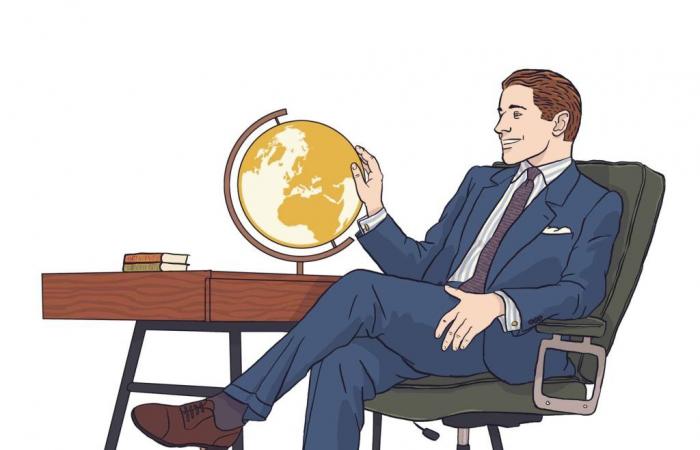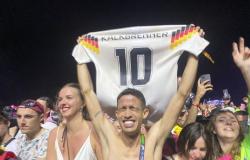Bay of Pigs, Battle of Britain, Syria, sports and Africa. Books of the week preview.
Back to classic
Spirou and Fantasio, The Bay of Pigs, Dupuis, 2024, €12.95.
A Spirou and Fantasio in the Franquin vein: same drawing, same humor, same gag. This is the aim of this so-called “classic” series which reconnects with the fiber of the great Belgian cartoonist. Spirou is dressed as a bellboy, Fantasio is a journalist, Seccotine accompanies them (she is one of the rare female characters in children’s comics), the marsupilami and the squirrel Spip are also part of it. The story takes place in 1961: Spirou and Fantasio find themselves in Cuba, at the time when the CIA is preparing the Bay of Pigs landing. Between clashes with the Cuban political police, support for Castro’s opponents and disputes with the Americans, the two heroes are at the heart of these historic days.
The album achieves the feat of linking the seriousness of the story to the humor of the Spirou series. The graphics refer to the Franquin period, with neat decorations and objects, particularly the vehicles. The Castro dictatorship is not passed over in silence, but evoked in a way adapted to a young audience. An album that relaxes and entertains and will delight Spirou fans.
In Syria
Joseph Kessel, In Syria, Folio, 2014, 6€.
First report by Joseph Kessel, published in 1926. At 28, Kessel already had experience as an aviator during the First World War and as an adventurer, having traveled through Siberia and several European countries. He spent a few weeks in Syria, then a French mandate, to see and understand. He brought back impressions, descriptions of Beirut and Damascus, and the clairvoyance of a French policy that did everything necessary to lose control of Syrian territory. Better to give up the game than to wear yourself out playing it badly. ” writes Kessel. By constantly changing the leadership of the mandate, when England assumes the stability of the leadership, by refusing to see the key role of clans, militias, religious groups, intoxicated by a non-existent universalism, the French Republic persists in a policy that can only lead to drama. It is not that the Orient is complicated, it is that French officials refuse to see it as it is and persist in seeing it as they would like it to be. Kessel describes the Druze, the Alawites, the Christians, the Muslims, the Arabs, the Turks, the Armenians, all these peoples who make up a Syria that goes from the sea to the desert, all these subtle human balances that allow this artificial structure to survive.
Hence the importance of rereading the classics and this brief text written in 1926. The error committed by French policy in Syria in 2011 is the same as that which was committed in the 1920s and which Kessel had perceived.
Kessel is the writer of peoples, ethnic groups, particularities. A man of travel and letters, he understands the diversity of human nature and the peoples who inhabit the earth, far from the unifying universalism which believes in Man while denying the existence of men. In this brief text, there is already everything that makes Kessel, the look and the style, and therefore all the reasons to read it.
Battle of the Sky
Jerome of Lespinois, The Battle of Britain, June–October 1940Tallandier, 2024.
The Battle of Britain is one of the most spectacular air wars in history. It took place between June and October 1940 between Winston Churchill’s Royal Air Force (RAF) and Marshal Goering’s Luftwaffe. After reaching the English Channel, German forces embark on a major airspace control operation against the English forces.
Delve into the operations of German bombers, who carried out raids against RAF installations and English civilian populations, with the aim of weakening the English reaction and affecting English morale.
Jérôme de Lespinois looks back on these three months of continuous fierce battle which will finally be marked by the failure of the Luftwaffe which, not having achieved its objective, abandons the idea of shooting down Fighter Command. This stop marks the end of the war in England which counts, in just a few months, thousands of victims, most of which are civilian losses.
Sport
Lukas Aubin, JB Guégan, Geopolitics of sportThe Discovery, 2024.
Sport has today become a major political lever. We see this in particular with the example of Russian and Belarusian athletes, forced to compete under a neutral banner since Russia’s invasion of Ukraine. Indeed, the visibility of sporting events makes them a popular place to assert ideas, convey a message or resolve crisis situations, making sport a new tool of influence on the international stage.
At the dawn of the Paris Olympic Games, Lukas Aubin and Jean-Baptiste Guégan return to the study of sport as an element of understanding the world in which we live. Beyond a futile leisure activity, sport is studied here as an element of measuring power, opening the door to a new terrain of confrontation between powers.
China / Africa
Xavier Aurégan, China, African power. Geopolitics of Sino-African relationsArmand Colin, 2024.
Initially limited to political, technical and military aspects, the Chinese presence in Africa has continued to diversify and intensify over the years. It now includes migrants as well as capital from companies, whether public or private.
Witness to the resurgence of the Middle Kingdom, this work explores the extent of Sino-African relations. Adopting a realistic approach, it examines the different domains and actors, taking into account their distinct temporalities, and draws on numerous maps and tables.
This study helps us understand how, from contract to contract and from investment to investment, China has become a major player in Africa, to the point of asserting itself as an African power.






